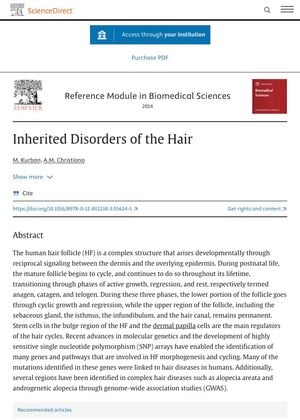Inherited Disorders of the Hair
January 2014
in “
Elsevier eBooks
”

TLDR The study concluded that genetic mutations affect human hair diseases and identified key genes and pathways involved in hair growth and cycling.
The 2014 study "Inherited Disorders of the Hair" discussed the complexity of the human hair follicle (HF), which cycles through phases of growth, regression, and rest throughout its lifetime. The lower portion of the follicle undergoes cyclic growth and regression, while the upper region remains permanent. The study highlighted the role of stem cells in the bulge region of the HF and the dermal papilla cells as the main regulators of these hair cycles. Advances in molecular genetics and the development of single nucleotide polymorphism (SNP) arrays have allowed for the identification of many genes and pathways involved in HF morphogenesis and cycling. Mutations in these genes have been linked to hair diseases in humans. Additionally, genome-wide association studies (GWAS) have identified several regions in complex hair diseases such as alopecia areata and androgenetic alopecia.


